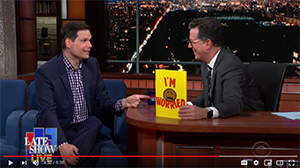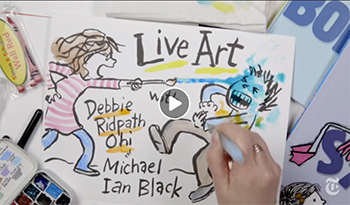Tuesday
Apr102007
What's the best way to handle mistakes in the middle of a performance?
Posted on  Tuesday, April 10, 2007 at 11:49AM
Tuesday, April 10, 2007 at 11:49AM
 Tuesday, April 10, 2007 at 11:49AM
Tuesday, April 10, 2007 at 11:49AM
Everyone makes mistakes sometimes, and unfortunately this occasionally happens in the middle of a performance. This could range from a barely noticeable stumble to completely forgetting one's lyrics or chords two-thirds of the way through a song.
In Urban Tapestry, Allison, Jodi and I have learned that the best thing is to just keep going. More often than not, no one else realizes we made a mistake.
We've also realized that being technically perfect is not as important as making a connection with the audience. We used to obsess about not making ANY mistakes, and would let even the smallest errors throw us completely. Our performances ended up technically excellent but sterile. Now we have more fun and focus on connecting with the audience.
Here are what some other people answered when I asked:
What's the best way to handle performance mistakes?
-------------
From Scott Snyder:
"Just keep on playing. Pick up where you stopped (if you stopped) and keep on going. If you stumble HARD and REALLY stop, just grin, pick a starting spot, and start over.
Your audience is really on your side. They want you to succeed and will forgive any error as long as you are sincere and keep going. They want to see you overcome the obstacles. Especially in filk, where many of your audience are also musicians, they empathize with your situation and want to see you get through it.
DO NOT apologize.
DO NOT point out the mistake. Either they caught it or they didn't - it doesn't matter.
DO NOT make derogatory comments about yourself, your playing or your instrument."
-------------
From Paul Kwinn:
"This a piece of advice I got from Kathleen Sloan, who in turn got it from her voice teacher:
Practice making mistakes. Which is not to say you should deliberately make mistakes while practicing. Mistakes will just naturally happen while you're rehearsing. Take advantage of that fact, and practice how you're going to cover/handle a mistake if it happens in front of people."
-------------
From Mike Whitaker:
"Depends to a large extent how catastrophic the mistake was.
Rule one, though, is don't apologise. Better people than you have screwed up far worse in public :)
Minor fluffs, or 'this is the last chord, it's the easiest one in the whole piece (a C) and I screwed it up. Twice."? Plough on, or if it's a repeating intro, sometimes it's better to loop round again so you're coming into a verse less rattled: the odds are 90%+ of your audience didn't notice. Trust me.
Frank Hayes disease or "What order DO the verses in Second Hand News go in?" syndrome: if you can, make it up and keep going: it's amazing how many folks won't notice. If you can't, then keep playing, loop the chords back to the start of the verse and try again: at this point a cheerful 'rewind!' or other light remark will probably earn you a sympathetic chuckle: we've all done it.
Oh-my-god-what-are-we-doing disease; a.k.a. he thinks it's in 4/4, she thinks it's in 3/4, he and she think it's in 2/4, he thinks it's in 6/8 and the singer's standing looking bemused. Or alternatively, 5 of the band are playing in C, and the keyboards player has forgotten to remove the transpose function on one synth, and her left hand's in C and her right in Eb. There is NO solution but to stop, laugh it off, make sure everyone's on the right page and start over.
In case you still believe that only you screw up? All the examples have happened to me, Phoenix or Fleetfoot Mike. In public, in front of (in at least one case) a paying audience. The overriding things to remember are 1) you are MUCH more critical of your mistakes than 98% of your audience. I have in the past come off stage to have a fellow band member REFUSE to go back on, despite the fact that the audience were clamouring for it, because they thought they'd played so badly. 2) If there's no way of not stopping, be it going back to start a verse, or a complete restart, laugh it off. even if you want to curl up and die. I make use of a cheery 'Ok. Shall we try that again with the *right* chords/words/notes".
But, to quote the lovely stevieannie and at risk of repeating myself: "amateurs practise till they get it right; professionals practice till they can't get it wrong". Or alternatively, Proper Preparation Prevents Poor Performance.
...and just in case I'm about to be accused of massive ego, no, I didn't mean me :) Lets see - there's a version of Love Me Tender that springs to mind. I have several bootlegs of Fleetwood Mac where certain bits just make me want to cringe... Even the pros screw up :)"
-------------
From "redaxe" on LJ:
" A short list of folks I've heard (or have recordings of) forget or mess up the lyrics includes Paul McCartney, Peter Gabriel, David Byrne, Mark Knopfler, Maddy Prior, and Linda Ronstadt. And those are just the ones I can think of off the top of my head.
ALL of them either just went on, or finished a verse, got corrected by a band member and made a joke of it, then picked right back up.
For me, the key is to remember that the audience wants you to succeed. So give them the chance."
-------------
From "cellio" on LJ:
"Yes, what he said. Don't angst about it; don't apologize; just fix it and go on. A quick comment to get them to laugh with you, like that "rewind!" or "oops, Frank Hayes dieseas" or whatever, does wonders.
Also, if you're part of a group, have an understanding before you go on stage of who's in charge. (This may vary from piece to piece, e.g. the lead singer is in charge, or the group may have a single leader.) If something catastrophic happens, like the key scenario above or a real bad tuning day or something, that person has the authority to say "you do X" (including "don't play", because the instrument is that far out of tune), and everyone else's job is to do it without arguing. Later, after the performance, you can discuss it to death -- but no discussions or arguments on stage.
Oh, and make sure the person in this role is in a position to hear everything. On the Mark once had a concert where we were on a wide stage with mikes and other equipment (that we don't normally play with) all around, and the instruments at opposite ends were out of tune with each other, but neither of us could hear that and the person in the middle didn't want to offend us by stopping us. Now she knows to do that; it's much better than annoying the audience. :-)"
-------------
From "mdlbear" on LJ:
"As an amateur performer of limited talent, I get lots of practice handling performance mistakes. In almost all cases (flubbed chord, transposed lines, ...) the best thing is to keep going. Sing a little louder if you're having trouble with the chords.
Really amazing mistakes, like starting in the wrong key or with the wrong melody, can be covered with a humorous remark like "I'll have to remember that one for the blooper album"."
-------------
From "randwolf" on LJ:
"John Hertz is fond of telling dancers, "think cat"--if possible, act like you meant to do it and go on."
-------------
From "tigertoy" on LJ:
"It's already been said, but it bears repeating: if you make a minor mistake, just pretend it didn't happen and keep on playing. A minor mistake is any one where you can do this. Most of your audience won't notice, and the ones who do won't care if you don't stop and call attention to it.
Being able to ignore minor mistakes and keep playing takes practice. Once you've pretty much learned a song, make a conscious effort to keep going through your mistakes, instead of going back and immediately correcting them. Getting used to just singing/playing through mistakes when you practice makes it a lot easier to do it in front of an audience. If you can, try to do something to make the song harder than what you really mean to perform so you'll make more mistakes, and practice hanging onto the song in spite of the mistakes. One good way to do this is to do the song much faster than it's supposed to be. Not only do you get practice on ignoring errors, but the song will seem easier when you do it at the right speed. (Just don't get so used to doing it super-fast that you forget to do it normal speed when you perform it!)"
-------------
From "catalana" on LJ:
"I agree with all the advice to keep going if possible. The other thing I've noticed is that, as screaming a mistake as it may seem to you, your audience may not have even noticed it. Did you sing a wrong line or a wrong word? Unless it's "Banned from Argo" (or something else similarly well-known), there's a good chance your audience didn't notice - you have the lyrics in front of you, but they don't. Similarly with playing a wrong chord, especially if it's fairly brief. You may know it was supposed to be a C, not a G, but your audience may not have noticed.
I once got asked to sing a really old song of mine (one that I hadn't sung in years) and I realized going into the chorus that I had no clue what the melody for the second and fourth lines of the chorus was. So I made something up. By the second repeat of the chorus I had remembered the correct music for the second line, and fixed it. I didn't remember the music for the fourth line until days later - but as far as I can tell, no one noticed. You can get away with a lot if you do it with confidence. *grin*"
-------------
Comments? Other suggestions? Please post below:
In Urban Tapestry, Allison, Jodi and I have learned that the best thing is to just keep going. More often than not, no one else realizes we made a mistake.
We've also realized that being technically perfect is not as important as making a connection with the audience. We used to obsess about not making ANY mistakes, and would let even the smallest errors throw us completely. Our performances ended up technically excellent but sterile. Now we have more fun and focus on connecting with the audience.
Here are what some other people answered when I asked:
What's the best way to handle performance mistakes?
-------------
From Scott Snyder:
"Just keep on playing. Pick up where you stopped (if you stopped) and keep on going. If you stumble HARD and REALLY stop, just grin, pick a starting spot, and start over.
Your audience is really on your side. They want you to succeed and will forgive any error as long as you are sincere and keep going. They want to see you overcome the obstacles. Especially in filk, where many of your audience are also musicians, they empathize with your situation and want to see you get through it.
DO NOT apologize.
DO NOT point out the mistake. Either they caught it or they didn't - it doesn't matter.
DO NOT make derogatory comments about yourself, your playing or your instrument."
-------------
From Paul Kwinn:
"This a piece of advice I got from Kathleen Sloan, who in turn got it from her voice teacher:
Practice making mistakes. Which is not to say you should deliberately make mistakes while practicing. Mistakes will just naturally happen while you're rehearsing. Take advantage of that fact, and practice how you're going to cover/handle a mistake if it happens in front of people."
-------------
From Mike Whitaker:
"Depends to a large extent how catastrophic the mistake was.
Rule one, though, is don't apologise. Better people than you have screwed up far worse in public :)
Minor fluffs, or 'this is the last chord, it's the easiest one in the whole piece (a C) and I screwed it up. Twice."? Plough on, or if it's a repeating intro, sometimes it's better to loop round again so you're coming into a verse less rattled: the odds are 90%+ of your audience didn't notice. Trust me.
Frank Hayes disease or "What order DO the verses in Second Hand News go in?" syndrome: if you can, make it up and keep going: it's amazing how many folks won't notice. If you can't, then keep playing, loop the chords back to the start of the verse and try again: at this point a cheerful 'rewind!' or other light remark will probably earn you a sympathetic chuckle: we've all done it.
Oh-my-god-what-are-we-doing disease; a.k.a. he thinks it's in 4/4, she thinks it's in 3/4, he and she think it's in 2/4, he thinks it's in 6/8 and the singer's standing looking bemused. Or alternatively, 5 of the band are playing in C, and the keyboards player has forgotten to remove the transpose function on one synth, and her left hand's in C and her right in Eb. There is NO solution but to stop, laugh it off, make sure everyone's on the right page and start over.
In case you still believe that only you screw up? All the examples have happened to me, Phoenix or Fleetfoot Mike. In public, in front of (in at least one case) a paying audience. The overriding things to remember are 1) you are MUCH more critical of your mistakes than 98% of your audience. I have in the past come off stage to have a fellow band member REFUSE to go back on, despite the fact that the audience were clamouring for it, because they thought they'd played so badly. 2) If there's no way of not stopping, be it going back to start a verse, or a complete restart, laugh it off. even if you want to curl up and die. I make use of a cheery 'Ok. Shall we try that again with the *right* chords/words/notes".
But, to quote the lovely stevieannie and at risk of repeating myself: "amateurs practise till they get it right; professionals practice till they can't get it wrong". Or alternatively, Proper Preparation Prevents Poor Performance.
...and just in case I'm about to be accused of massive ego, no, I didn't mean me :) Lets see - there's a version of Love Me Tender that springs to mind. I have several bootlegs of Fleetwood Mac where certain bits just make me want to cringe... Even the pros screw up :)"
-------------
From "redaxe" on LJ:
" A short list of folks I've heard (or have recordings of) forget or mess up the lyrics includes Paul McCartney, Peter Gabriel, David Byrne, Mark Knopfler, Maddy Prior, and Linda Ronstadt. And those are just the ones I can think of off the top of my head.
ALL of them either just went on, or finished a verse, got corrected by a band member and made a joke of it, then picked right back up.
For me, the key is to remember that the audience wants you to succeed. So give them the chance."
-------------
From "cellio" on LJ:
"Yes, what he said. Don't angst about it; don't apologize; just fix it and go on. A quick comment to get them to laugh with you, like that "rewind!" or "oops, Frank Hayes dieseas" or whatever, does wonders.
Also, if you're part of a group, have an understanding before you go on stage of who's in charge. (This may vary from piece to piece, e.g. the lead singer is in charge, or the group may have a single leader.) If something catastrophic happens, like the key scenario above or a real bad tuning day or something, that person has the authority to say "you do X" (including "don't play", because the instrument is that far out of tune), and everyone else's job is to do it without arguing. Later, after the performance, you can discuss it to death -- but no discussions or arguments on stage.
Oh, and make sure the person in this role is in a position to hear everything. On the Mark once had a concert where we were on a wide stage with mikes and other equipment (that we don't normally play with) all around, and the instruments at opposite ends were out of tune with each other, but neither of us could hear that and the person in the middle didn't want to offend us by stopping us. Now she knows to do that; it's much better than annoying the audience. :-)"
-------------
From "mdlbear" on LJ:
"As an amateur performer of limited talent, I get lots of practice handling performance mistakes. In almost all cases (flubbed chord, transposed lines, ...) the best thing is to keep going. Sing a little louder if you're having trouble with the chords.
Really amazing mistakes, like starting in the wrong key or with the wrong melody, can be covered with a humorous remark like "I'll have to remember that one for the blooper album"."
-------------
From "randwolf" on LJ:
"John Hertz is fond of telling dancers, "think cat"--if possible, act like you meant to do it and go on."
-------------
From "tigertoy" on LJ:
"It's already been said, but it bears repeating: if you make a minor mistake, just pretend it didn't happen and keep on playing. A minor mistake is any one where you can do this. Most of your audience won't notice, and the ones who do won't care if you don't stop and call attention to it.
Being able to ignore minor mistakes and keep playing takes practice. Once you've pretty much learned a song, make a conscious effort to keep going through your mistakes, instead of going back and immediately correcting them. Getting used to just singing/playing through mistakes when you practice makes it a lot easier to do it in front of an audience. If you can, try to do something to make the song harder than what you really mean to perform so you'll make more mistakes, and practice hanging onto the song in spite of the mistakes. One good way to do this is to do the song much faster than it's supposed to be. Not only do you get practice on ignoring errors, but the song will seem easier when you do it at the right speed. (Just don't get so used to doing it super-fast that you forget to do it normal speed when you perform it!)"
-------------
From "catalana" on LJ:
"I agree with all the advice to keep going if possible. The other thing I've noticed is that, as screaming a mistake as it may seem to you, your audience may not have even noticed it. Did you sing a wrong line or a wrong word? Unless it's "Banned from Argo" (or something else similarly well-known), there's a good chance your audience didn't notice - you have the lyrics in front of you, but they don't. Similarly with playing a wrong chord, especially if it's fairly brief. You may know it was supposed to be a C, not a G, but your audience may not have noticed.
I once got asked to sing a really old song of mine (one that I hadn't sung in years) and I realized going into the chorus that I had no clue what the melody for the second and fourth lines of the chorus was. So I made something up. By the second repeat of the chorus I had remembered the correct music for the second line, and fixed it. I didn't remember the music for the fourth line until days later - but as far as I can tell, no one noticed. You can get away with a lot if you do it with confidence. *grin*"
-------------
Comments? Other suggestions? Please post below:
in  Performance
Performance
 Performance
Performance 








Reader Comments